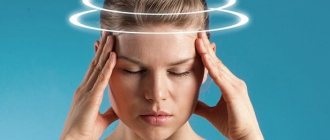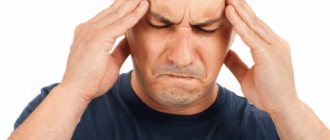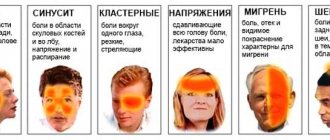When a small child has a headache, it frightens him and forces him to consult a doctor. But if this symptom is observed in a teenager, the situation changes. An adult remembers that he himself periodically has headaches - and nothing, he’s alive. In addition, many say that headaches during adolescence are a common phenomenon caused by hormonal changes.
- chronic diseases;
- disturbances in the functioning of blood vessels - rather, of a congenital nature;
- genetic characteristics,
This is the cause of 73% of headaches in teenagers. It may be caused by reasons that are not obvious at first glance:
- prolonged sitting at a table or at a computer - when the neck is in a tense state;
- uncomfortable head position during sleep;
- frequent stress;
- conflict situations.
It is with tension headaches that a teenager complains that he has a headache every day: the breaks are so short that they are almost unnoticeable. The pain begins right in the morning, feels like pressing, is localized in the forehead and temples, and does not get worse from physical activity. During the day it can change its location and intensity.
This disease also often debuts in adolescence - due to the fact that the active growth of skeletal bones has begun, but they have not yet had time to harden. And then the teenager begins to read while lying down, go to concerts or other events where he needs to stretch and tilt his neck - and the spine in the cervical region bends. Blood circulation in the brain deteriorates, and a headache appears.
This is the main cause of headaches in teenage girls. Boys also get migraines, but they become less common in adolescence.
Migraine is based on a hereditary pathology in some part of the vessel in the brain. It can be suspected if at least one parent suffered from this pathology. The manifestation of the disease is quite scary: it is a very severe headache, which intensifies with physical activity, light, loud sounds, the smell of gasoline, drinking coffee, chocolate.
The pain is most often localized in one half of the head; some forms of it may be accompanied by speech disorders, visual impairment, paresis of the limbs, and vomiting. All this is very similar to meningitis or subarachnoid hemorrhage. Migraines are distinguished only by:
- no increase in temperature;
- disappearance of focal symptoms along with the disappearance of headache;
- absence of any changes in the interictal period.
If a teenager does not eat on time, he may develop a headache. There may be 2 reasons for this:
- non-critical decrease in blood sugar - as a sign of pancreas or liver disease;
- migraine.
The reasons why a teenager has a headache can be chronic or acute:
In acute diseases, headache is accompanied by other symptoms: fever, sore throat, runny nose. In chronic cases, pain may be the only symptom.
Hormonal changes in adolescence can lead to vegetative-vascular dystonia, which sometimes causes an increase in blood pressure. As a result of hypertension, headaches appear (most often the back of the head begins to hurt).
Other causes of hypertension include diseases of the kidneys, adrenal glands, and brain. Sometimes high blood pressure can be caused by consuming large amounts of salt, energy drinks, or coffee.
When the heart does not work properly (irregularly), not enough blood flows to the brain. And in response to hypoxia, a headache appears.
Please note: the teenager will not necessarily feel the rhythm disturbance. Only extrasystoles are felt (as a sinking heart or, conversely, a sharp blow) and an increase in heart rate. More severe arrhythmias may not be felt.
When visual acuity decreases, the teenager begins to look closely: at the board, at the numbers of public transport, at the faces of friends. In this case, the cause of the headache is overstrain of the extraocular muscles.
When you feel sick and have a headache, it can be either an increase or decrease in intracranial pressure. In many cases, they occur against the background of intoxication due to acute respiratory viral infections, taking some medications, or bad habits. But this can also be caused by an acute brain disease, for example, meningitis or subarachnoid hemorrhage. Therefore, nausea and headache, even without fever, even if it has passed, requires examination by a neurologist.
Smoking, alcohol, and most drugs can cause headaches when a teenager first tries them. This happens because some of them have a direct effect on the blood vessels of the brain, while others cause intoxication.
Dizziness in children: causes and classification of the disease
Dizziness in children occurs for various reasons, and children of any age can suffer from vertigo.
Unfortunately, this problem can be difficult to identify not only for parents, but also for doctors, since a small child cannot correctly describe his illness. This is especially true for children who have not yet learned to speak.
Most often, when dizziness occurs, children's behavior may change. Babies often refuse to move, and when they move, they feel the need to hold on to something.
Older children develop fear when getting out of bed, especially after illness. Parents do not always pay attention to such symptoms. But you should still be careful and, with the help of a doctor, identify the causes of such ailment.
Is there nausea and vomiting with coronavirus in humans?
Most often, COVID 19 enters the body through the nasopharynx or mucous membranes of the eyes, after which it descends into a person’s lungs and causes pneumonia. However, in some cases, the pathogen first affects the gastrointestinal system, then not respiratory, but digestive negative symptoms develop.
Nausea is a symptom of coronavirus, although it occurs in an average of 25% of people and in some countries in less than 5%. For most, viral activity is interfered with by gastric juice. It simply kills 80% of the pathogens that enter the body, and the remaining 20% are significantly weakened, do not cause significant harm and are eliminated along with toxins.
But this doesn't always happen. In some people, the functions of the digestive tract are impaired, primarily due to poor production of gastric juice. Doctors note that with a viral infection, patients most often feel sick:
- with weakened immunity;
- with chronic ailments of the digestive system - ulcers, gastritis, liver and gallbladder diseases.
Attention! The symptom is especially common in people with a hypoacid form of gastritis; the production of caustic gastric juice in this case is reduced.
If there are disturbances in the functioning of digestion, it is easier for infections to gain a foothold even in the aggressive environment of the gastrointestinal tract
Does coronavirus cause vomiting in adults?
Adult patients are least susceptible to developing gastrointestinal disorders due to the virus. That is why the symptom is considered quite rare and is not included in the list of main ones.
According to doctors, coronavirus usually causes vomiting in the presence of chronic lesions of the digestive tract. Most often it is accompanied by other signs of the disease - fever, weakness, headache. Interestingly, respiratory manifestations may be absent for a long time; in the presence of nausea, cough and shortness of breath develop on average on the 3rd day. Doctors also note that recovery in such patients is delayed.
Can children vomit with coronavirus?
Statistics show that children develop an unusual first symptom more often. Babies also suffer from diarrhea and abdominal pain. This is due to the fact that their digestive system is not yet fully formed and, even in the absence of chronic illnesses, is not able to adequately resist viral invasion. According to doctors' observations, children vomit more frequently and profusely.
Main causes of dizziness in children
Most often, vertigo develops in childhood for the following reasons:
- motion sickness;
- dysfunction in the autonomic nervous system;
- helminthic infestations;
- brain tumor;
- inflammatory processes in the middle ear;
- inflammation of the membranes of the brain;
- head injuries;
- anemia;
- decreased glucose levels;
- poisoning of the body;
- severe hunger.
In children, headaches most often occur with fever or a viral infection. If your child complains of a headache for other reasons, you should consult a doctor immediately.
We will talk about the causes of dizziness in men in this section. What accompanying symptoms accompany vertigo?
How can you help?
There are times when common sense suggests that dizziness is not caused by pathological reasons. Then you can resort to simple methods that will help relieve discomfort and avoid recurrence in the future.
- First aid: if possible, give the baby a horizontal position and maintain it until the head stops spinning.
- If your baby wakes up at night because he is dizzy, leave the night light on throughout the night - this way the baby will be able to wake up and see some stationary object and focus on it.
- Monitor the water temperature when swimming. An overly hot bath causes blood to rush to the skin, vasodilation and dizziness.
- Avoid dehydration. On a hot summer day, your child should drink a glass of water every hour.
In his practice, a pediatric neurologist often has to deal with children’s complaints of dizziness. However, quite often both parents and children themselves use the term “dizziness” to mean a wide variety of conditions. To make a diagnosis and prescribe treatment, you first need to understand the causes of such symptoms.
Natalya Vladimirovna Kulikova, a neurologist at the CDC MEDSI on Krasnaya Presnya, talks about what problems underlie the appearance of dizziness (or vertigo) and what to do if they regularly bother a child.
Psychosomatics
Many parents whose children complain of dizziness fear that the child has some dangerous disease. However, dizziness in children is often a sign of psychosomatic disorders.
In other words, their condition is usually caused by increased psycho-emotional stress. Children are especially susceptible to what is happening around them and are acutely worried about studying, communicating with peers and parents.
If dizziness lasts more than 10 minutes and is not accompanied by vomiting and hearing loss, then, as a rule, it is psychogenic.
That is, such dizziness is a symptom of overwork, anxiety, and stress.
As a rule, such conditions require normalization of sleep and rest patterns, reduction of stress, and administration of sedative therapy.
Random seizures
Children often experience so-called paroxysmal (manifested by attacks) dizziness
– usually these attacks are sudden and short-lived. Their duration is usually no more than three minutes. Ataxia, that is, partial or complete loss of coordination, is less pronounced. Having experienced the first episodes, the child subsequently independently understands that he needs to lie down or kneel down.
Rarely, these phenomena are accompanied by vomiting and nystagmus (involuntary trembling of the eyeballs).
At the same time, unlike epileptic seizures, consciousness remains clear and speech is clear. To clarify the diagnosis, the doctor must conduct an EEG (electroencephalography).
Turned sharply
There is also benign paroxysmal positional vertigo.
It occurs when the body position changes. At this point, objects and the room may seem to be spinning in the opposite direction.
Any change in body position provokes or intensifies these attacks.
In young people and children, such disorders are quite rare.
Seasick
Sometimes dizziness is caused by motion sickness in transport.
This type of imbalance is called kinetosis. These sensations are familiar to almost all people, even those who are absolutely healthy. Sliding down a slide, swinging, water travel - this is an incomplete list of popular entertainment that causes slight dizziness and nausea. However, the vestibular system of children is much more sensitive; trips and travel, as well as unpleasant odors, are more difficult for them to tolerate.
Also, kinetosis can be triggered by overwork – both physical and moral.
No air
Dizziness often occurs due to a lack of oxygen in a stuffy room, with a decrease in blood pressure, cardiac arrhythmias, a decrease in hemoglobin due to anemia, dehydration, intoxication due to infectious diseases and poisoning. Such dizziness is not systemic (not true): there is a feeling that the image is “floating”, darkening before the eyes, and the child is staggering.
In this case, it is a violation of spatial perception.
Infection
Dizziness can also be a concomitant symptom in the case of infectious pathologies.
The vestibular apparatus is located in the inner ear, so when inflammatory processes occur in the ENT organs, children may complain of dizziness.
Meniere's syndrome
True (systemic) dizziness may be one of the symptoms of Meniere's syndrome.
This is a pathology of the ear, usually accompanied by hearing loss. With this disease, the amount of endolymph in the ear cavity increases.
The accumulating liquid begins to put pressure on the cells that are responsible for balance.
Upon examination, the child exhibits nystagmus - rhythmic oscillatory movements of the eyeballs. This condition is often accompanied by vomiting. In this case, hospital treatment is required.
This is already serious
If dizziness occurs simultaneously with ringing in the ears, headaches in the occipital region
, speech and vision disorders, it is recommended to do an MRI or CT scan to exclude serious diseases (such as, for example, space-occupying lesions, encephalomyelopathy, vascular malformations, craniovertebral junction anomalies).
It is believed that the cause of dizziness may be vascular pathology, stenosis of the vertebral arteries
.
Dizziness (vertigo) is an imaginary sensation of rotation of surrounding objects or the patient’s body. There are quite a few causes of the disease. If dizziness is detected in a child, a full examination should be carried out to identify the causes of the disease. Vestibular disorders in children can be caused by infection (including neuroinfection), pathology of the vestibular apparatus, neoplasms or vascular damage to the brain, migraine headaches, ischemia of brain tissue, diseases of the cervical spine, hydrocephalus.
Causes of dizziness and nausea in teenagers
In adolescents, vertigo and nausea most often occur for several reasons:
- decreased hemoglobin;
- poisoning with drugs, alcohol;
- brain tumors;
- helminthic infestations;
- meningitis, encephalitis;
- acute respiratory infections, ARVI;
- inflammation and ear injury.
It is worth noting that some teenage girls at this age begin to closely monitor their figure and try different diets. Since the body is still developing at this age, fasting and low-calorie nutrition can lead to the development of dizziness, anemia and even fainting.
Sometimes vertigo occurs in adolescents after prolonged sitting at a desk, when bending the body, or turning the head. Doctors explain this symptom by the fact that the blood vessels of the brain and the entire cardiovascular system are still in a state of development. As a rule, vegetative-vascular dystonia most often appears in adolescents 14-15 years old, often accompanied by surges in blood pressure. In this case, the teenager may not only feel dizzy, but also experience periodic weakness, pallor, and darkening of the eyes.
If vertigo occurs due to damage to the membranes of the brain, this symptom is usually accompanied by an increase in temperature and a deterioration in general well-being.
Parents should be attentive to all complaints from their child.
If dizziness occurs in young children and adolescents, you should definitely consult a doctor to determine the cause and treat the problem. Vertigo often goes away after the underlying disease is cured.
Such a dangerous disease as multiple sclerosis can be diagnosed not only in adults, but also in children. Multiple sclerosis in children - who is at risk and how does this disease manifest itself?
What to do if a teenager has frequent headaches
If you suppress a headache with pills, after a while it comes back again. Even stronger and, as always, at the wrong time. Without taking proper measures, the pain becomes chronic and interferes with life. Find out how site readers cope with headaches and migraines using a cheap remedy.
In some cases, the causes that cause headaches are symptoms of diseases that require immediate treatment.
Migraine is a hereditary disease that in most cases occurs in the female population. Its first signs appear around the age of 14, when hormonal changes occur in the child’s body. Migraine is manifested by unpleasant pain that spreads only to one area of the head in the temple and may be accompanied by nausea, vomiting, and sensitivity to external factors: bright light, sounds, smell. Headaches are like attacks that last for different periods.
Children with a certain type of psychological characteristic are susceptible to migraine attacks. This is a child with leadership qualities, high social activity, good social adaptation, and anxiety.
Migraine attacks can be triggered by the following factors:
- sudden change in weather;
- stress;
- the period including menstruation and ovulation;
- lack of sleep or, conversely, excessive sleep;
- taking certain medications;
- different types of vestibular stimuli (flying on an airplane, traveling in a car, bus, swimming on sea transport, riding on a swing);
- eating chocolate, eggs, cheese, citrus fruits, nuts, smoked meats, tomatoes, canned food, fatty and spicy foods, alcohol;
- constipation;
- constant noise, bright light;
- unpleasant, pungent odor.
What is dizziness and how does it manifest?
A healthy person is characterized by a state of balance. It is provided by many physiological processes. The brain receives signals from the visual system and the vestibular apparatus. Then the deciphered signals are converted into impulses from the cerebral cortex, which are addressed to the human muscles. The muscular system is responsible for the stability of the body and the correct position of the eyeballs.
However, small children cannot always talk about dizziness or correctly describe their sensations. The fact that a child is dizzy is indicated by some features of his behavior. So, the baby tries to close his eyes, may rest his forehead against a wall or piece of furniture, or lie face down. Sometimes the child clasps his head with his hands, he can press himself against the support and sit motionless. Quite often, the child becomes dizzy and nauseous, which is accompanied by pale skin and increased salivation.
Can coronavirus start with vomiting?
Nausea and dizziness with coronavirus in some patients become the first signs of infection and indicate the penetration of the pathogen into the body. In such cases, a cough may not appear for several more days. There have even been isolated cases of the disease where no respiratory symptoms occurred at all, and the patients suffered solely due to indigestion.
With nausea due to Chinese infection, a temperature of up to 38 ° C develops
However, even without a cough, COVID 19 not only causes nausea, the condition is usually accompanied by fever, migraine and general weakness. When all of these signs are combined, it makes sense to get tested for COVID 19.
Attention! If the patient has only nausea without other disorders, then first of all you need to check that we are not talking about ordinary poisoning.
The child is dizzy: the causes of the phenomenon
Often, non-pathological causes cause dizziness in a baby. So, why does a child feel dizzy? This condition can be provoked by the following factors:
- Overwork or being in a stuffy room. You need to send the baby to fresh air or ventilate the room in which he is located.
- Hunger. Sometimes dizziness is caused by the most common hunger. If the child has not eaten for a long time for any reason, first give him compote or fruit juice to drink, and then offer him food.
- Taking a bath that is too hot. In young children, the body's thermoregulation system is not yet completely perfect. Therefore, if he spent a lot of time in a hot bath, he may feel dizzy. In this case, after the bath you should give him some cool water to drink and put him to bed, without wrapping him up too much.
- Darkness in the room. Due to the imperfection of the vestibular system, some babies experience dizziness in the dark, especially when waking up at night. To avoid this condition, it is worth leaving dim lights in the child’s room at night.
However, dizziness can often be caused by various diseases and pathological conditions. So, if a child is dizzy, the reasons may be the following:
- disturbances in the functioning of the nervous system;
- anemia (decreased hemoglobin level in the blood);
- kinetosis (motion sickness syndrome);
- low blood glucose concentration;
- injuries or inflammation of the middle ear;
- brain injuries;
- inflammatory diseases of brain tissue, such as encephalitis, meningitis;
- poisoning, especially with drugs, mushrooms and alcohol;
- helminthic infection.
Only a doctor can determine exactly why a child is feeling sick and dizzy. Therefore, you should not delay consulting a specialist if your baby develops dizziness.
Parents should immediately call an ambulance if their child experiences dangerous symptoms accompanying dizziness:
- Strong headache;
- blurred vision or double vision;
- loss of consciousness;
- nystagmus is a rhythmic movement of the eyes in which they move slowly in one direction and then quickly return;
- tinnitus.
It is also urgent to show your baby to the doctor if he has attacks of dizziness repeatedly, last more than 30 minutes, or the attack occurs after a fall or hit his head.
How to treat headaches in a teenager
As you can see, there are many causes of headaches – not even half are listed here. Each of them has its own examination and treatment. Therefore, only a neuropathologist can decide what to do.
Before visiting, you need to ensure your child has a healthy lifestyle:
- sufficient sleep;
- obtaining healthy proteins, vitamins and microelements from food;
- walks in the fresh air, rather than relaxing at the computer;
- support for parents during traumatic situations or when receiving bad grades.
So, don't blame your teen's headaches on hormones. Contact a neurologist, cardiologist, pediatrician, rule out all terrible causes and do not forget about love for your grown-up child!
Feeling dizzy and/or dizzy during pregnancy – why, and what to do?
Dizziness and nausea are the most unpleasant symptoms that a woman encounters if she is pregnant. They usually accompany her during the 1st (sometimes 2nd) trimester.
These symptoms most often occur in the morning, but can also appear in the afternoon. If these signs are not accompanied by other unpleasant symptoms, relaxation can help (dizziness and nausea go away after lying down and sleeping). Try to rest during the day, for example after lunch.
The reasons may also lie in the fact that a woman, if she is pregnant, quits smoking every day.
More than one pregnant woman asks one question: “What should I do if dizziness occurs several times a day as soon as I close my eyes?” This is most likely a consequence of the fluctuations in blood pressure that characterize this period. In such situations, special training can help, which will be useful not only for the mother, but also for the unborn child.
Types of nausea
The main symptom of nausea is a sucking and unpleasant sensation that rises from the pit of the stomach to the throat, causing the desire to vomit.
She may “come” alone, but is often accompanied by:
- diarrhea;
- vomit;
- temperature;
- sweating;
- pallor;
- dizziness;
- cooling of feet and hands;
- darkening of the eyes;
- increased breathing and heart rate;
- drowsiness;
- weight loss.
Doctors identify the following types of nausea:
- If it is caused by poisons, chemicals or spoiled food, then it is toxic.
- Reflex nausea is called nausea, which is caused by disturbances in the mucous membrane of the digestive organ and most often manifests itself after eating and taking certain foods.
- Doctors call cerebral a nauseating condition caused by disorders in the brain, for example, increased intracranial pressure, but more often it is a consequence of serious illnesses: atherosclerosis, benign or malignant tumors.
- If the patient suffers from neuroses, then their attacks often pass with nausea, called vestibular. It is also typical for women during pregnancy and menopause.
- Metabolic nausea is caused by diabetes, dieting and fasting, an unbalanced diet and metabolic disorders.
You can recover from this symptom only by finding its cause. If this is not pregnancy, then first of all you should undergo an examination of the gastrointestinal tract.
Symptoms of dizziness
Signs of vertigo are divided into four clinical groups:
- Vestibular vertigo. An adult has the impression of falling from a height of height. The surrounding objects float in the eyes. In addition to the rocking of everything around, symptoms appear: increased sweating, nausea with vomiting, hearing impairment, slight visual vibration.
- Pre-fainting state. A sudden drop in blood pressure and heart disease cause loss of consciousness and a feeling of cloudiness. Poor health is accompanied by pale skin, nausea, darkness in the eyes, sweating, and rapid pulse.
- Lack of balance. Vertigo without nausea is associated with unsteadiness when walking. The patient has difficulty standing in one position, swaying a little. Orientation is lost in the dark, and at night a person bumps into surrounding objects.
- Psychogenic vertigo. Worldview characteristic of severe mental disorder, depression. The condition is accompanied by nausea and heaviness in the head. A person walks with a clouded consciousness, the surrounding space looks like a viscous substance. Dizziness causes fear of falling.
What kind of dizziness are there?
There are several types of dizziness:
- Acute dizziness. This type is accompanied by severe headache, tinnitus, hearing loss, in which the child becomes very nervous and cries. An acute condition can be a symptom of ARVI or infectious diseases, inflammation of the middle ear. Often this condition occurs in a child due to physical overexertion; in such cases, he will try to squat down to fix the static, nausea, vomiting, sweating, and a feeling of suffocation appear.
- Regular dizziness. The child is exposed to this condition constantly, for some time; in this case, the baby is at risk of getting injured due to coordination loosened by attacks. Regular dizziness occurs due to a disorder of the central nervous system and vestibular apparatus.
- Periodic dizziness is characterized by a sharp onset and an equally sudden cessation. The cause of this symptom is usually migraine or congenital torticollis.
- Abnormal dizziness. Typically, this condition appears in children due to long-term use of certain medications. This symptom is very dangerous and pronounced. Diuretics and aminoglycosides produce a side effect manifested by damage to the vestibular apparatus.
Causes of severe dizziness. what to do
Enter your pressure130
Search in progress Not found
https://www.youtube.com/video/Hj0kHMu4BaI
In most cases, the reasons for dizziness in women and men are the same. After all, the concepts of the human body do not have sexual properties. This disease occurs when the main systems of the body are disrupted: the visual, muscular and vestibular apparatus. If additional symptoms appear in the form of nausea and weakness, this indicates the existence of other diseases. Causes of very severe dizziness:
- One of the most terrible reasons for the occurrence of the disease is a brain tumor. If your hearing worsens due to dizziness, or blood or pus comes out of your ears, you should immediately consult a specialist. This is a suspicion of cancer.
- Teenage children may also experience dizziness, hearing problems, and vomiting. If this happens, then Meniere's syndrome most likely develops. It is dangerous because there is a possibility of turning into neuritis.
- The cause of severe dizziness in women and men can be a quick stroke. For several days, the person feels weak, drowsy, and is tormented by constant vomiting and headache.
- Your head may feel dizzy due to a concussion or any other injury.
- Due to problems with the vestibular system and determining position in space, dizziness also occurs. Such people cannot travel on public transport, they begin to panic.
- Also, this disease sometimes occurs as a result of taking various medications, especially antibiotics. If this happens, it is recommended to change the drug or reduce the dosage.
Why does a child feel dizzy (vertigo) and feel sick - the main reasons
Infection
1. Bacterial labyrinthitis – dizziness, nausea, vomiting and hearing loss. Dizziness usually occurs during coughing, sneezing, or pressure on the ear; Symptoms are not relieved by lying down or sleeping.
2. Bacterial meningitis – fever, impaired consciousness, meningeal irritation; reasons may be due to the expansion of other infections.
Vestibular neuritis - dizziness, sometimes nausea, but there is a good prognosis. Improvement occurs within 48 hours; the most common causes are viral etiology. Symptoms are relieved by lying down and/or sleeping.
Side effects of medications and drugs - most anticonvulsants, antipsychotics and some antibiotics are characterized by nausea, dizziness or headache after taking them. Symptoms may occur at any time of the day and are not relieved during or after sleep or lying down, but disappear when the medication is stopped.
Kinetosis is a disproportion between visual and vestibular inputs; the problem manifests itself mainly in a child while moving in a vehicle. The disease cannot be cured, but relief of symptoms occurs after taking special medications. While sleeping in transport, the child’s symptoms do not improve; they can wake him up.
Signs of dizziness in a young child
Even the youngest children are not spared the symptom of dizziness; in this case, parents need to be alert and know the signs of this symptom, because an infant will not be able to complain.
The most pronounced signs of dizziness in infants:
- increased moodiness, tearfulness;
- desire to lie head down, mainly on the forehead;
- impaired coordination of movements;
- nausea and vomiting;
- reluctance to get out of bed;
- involuntary eye movements;
- placing your head on a fixed surface, for example, a wall, headboard. In this way the baby tries to stop the spinning;
- the child puts his hands to his forehead, eyes, head;
- fainting.
Features of first aid
What to do if a person has an attack of dizziness with nausea depends on the complexity of the situation. Basically, the use of home methods before visiting a doctor is limited to creating comfortable conditions that provide an influx of fresh air, plenty of fluids and a minimum of head movements. In situations where the deterioration in well-being is not caused by a serious illness, you can use one of the tips presented.
- If the head is dizzy as a result of a sudden attack of lightheadedness caused by nervous overstrain, then as first aid the patient should be seated, preferably near an open window, and given ammonia to sniff. After a few minutes, the person will feel better, and the unpleasant symptoms will disappear.
- If you usually feel dizzy and nauseous when traveling for many hours by bus or car, sucking on mint candies or taking special anti-motion sickness pills will help prevent a pathological attack.
- If women feel dizzy due to long-term adherence to a strict diet, then the unpleasant symptoms will quickly go away if they drink warm, sweetened tea or eat a piece of chocolate or candy.
- If you feel sick due to food poisoning, then taking sorbents and performing a bowel cleansing procedure with an enema, as well as trying to cleanse the stomach by causing a gag reflex, will help remove the symptoms of intoxication.
- If your head hurts due to a migraine attack, then a light manual massage using aromatic oils or a gradual intake of first vasodilators, and after a while - vasoconstrictors, will help to cope with it. If you have a migraine, it will also be useful to lie down for a while in a shaded room. In addition, if you have a headache and pressure in your temples, taking herbal remedies will help relieve the symptoms.
If the feeling of dizziness and nausea appears after injury to the spine or head, only qualified medical care can alleviate the symptoms. Self-medication in this situation is ineffective and can even cause harm.
Main pathological causes
Dizziness can result from drug poisoning or from their effect on brain tissue. Severe dizziness for a long time is a symptom of the following pathologies:
- Multiple sclerosis. The disorder is one of the signs of pathology in women after 60 years of age. Inflammatory deposits form around blood vessels and nerve endings, causing their necrosis.
- Meniere's disease. Feeling dizzy when trying to change body position or when the woman is lying down. May be accompanied by nausea and hearing problems.
- Disturbances of the internal environment of the body. Occurs with hyperglycemia and hypoglycemia, changes in ion levels, accumulation of metabolic waste (with renal and liver failure), dehydration.
- Inflammation of the nerve of the inner ear. Hearing problems and sudden attacks occur when the head is turned sharply without accompanying symptoms.
- Ophthalmological diseases. Mainly typical for women over 60 years of age. Dizziness occurs in acute forms of glaucoma with increased ICP and other disorders that lead to double vision.
- Brain diseases. With any brain disease, a person may experience increased intracranial pressure, which causes pain and dizziness.
- Problems with blood vessels. Oxygen-rich blood does not reach the brain in the required quantity, resulting in severe headaches, dizziness, and nausea.
- Cardiovascular diseases. Impaired heart function leads to a lack of oxygen in the brain. Vertigo is one of the signs of its deficiency.
- Neoplasm or metastases in the cerebellum, brain stem. Dizziness is accompanied by impaired coordination of movements, staggering, fainting, and nausea.
- Encephalitis. If the cause is an infection, the woman may feel dizzy and have a headache, fever, severe weakness, convulsions and blurred vision.











